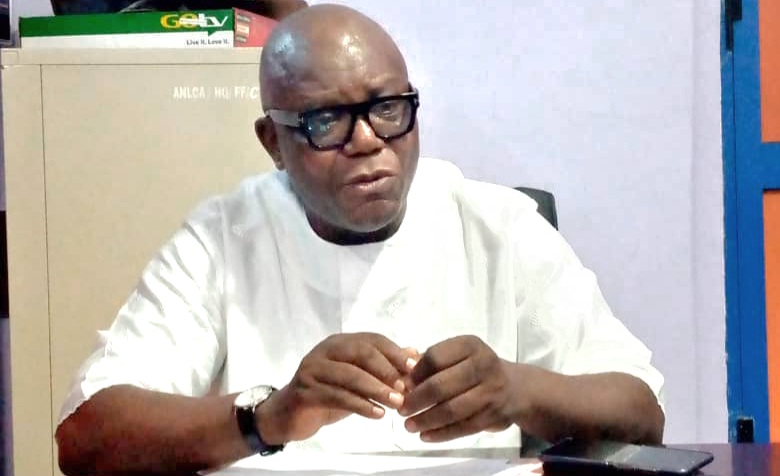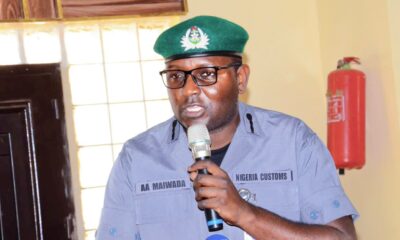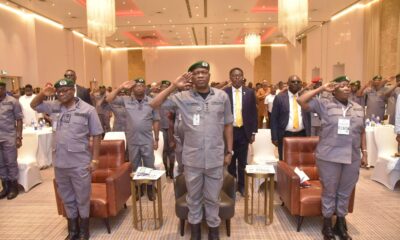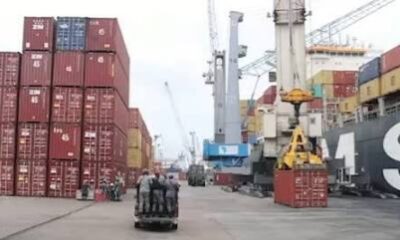Business Maritime
‘Why 8-4-6 Code Is Catering For All Categories of Imported Vehicles’ – Oduntan

The Vice President of the Association of Nigerian Licensed Customs Agents (ANLCA), Prince Segun Ountan has said that there is no opposition to the implementation of the 8-4-6 policy on imported vehicles clearance as been bandied in some quarters, noting that the recent circular on the matter issued by the Nigeria Customs Service (NCS) was merely a routine reminder.
Oduntan explained that there is also no conflict and or controversy regarding the current situation where all category of vehicles are cleared under the policy, irrespective of whether such vehicles have the required standard Vehicle Identification Numbers (VIN) or not; since it is a stop-gap arrangement.
Oduntan in an interview with select business journalists in his office, also spoke about other industry issues in the front burner, including the implementation of the 4% Free on Board (FOB) levy on imports, the 1% Comprehensive Inspection Service Charge (CISS) and 7% Surcharge Levy.
While affirming that ANLCA members were also fully prepared for the implementation of the National Single Window (NSW) project slated to take off first quarter of 2026, Oduntan raised concerns about the divisive activities of some agencies of government. Eguono Odjegba was at the media chat and brings you the conversation. Excerpt:
What’s the update on B’Odogwu, especially with Customs’ promise to address some identified challenges?
The only issue with B’Odogwu has to do with old jobs – the transmission of old Pre-Arrival Assessment Reports (PAARs) and old Form ‘M’ to the new platform, which caused initial hiccups. That has been addressed, and it’s running perfectly now.
How about the issue of migration from NICIS 11 or is the break absolute and complete at the moment?
Initially, there were hiccups because it was centrally controlled in Abuja for security purposes. But now, about three to five members of the B’Odogwu team have been deployed to every command. So, the backlog is being cleared much faster.
We heard that Customs recently suspended the use of the 846 code for vehicle valuation due to alleged abuse. What’s the current situation with vehicle clearance?
There’s no abuse in the system. The circular Customs issued was merely a reminder. What actually happened isn’t a suspension; it’s simply that vehicles with standard Vehicle Identification Numbers (VINs) must not be cleared using the 846 code. Vehicles without standard VINs will still be processed using the 846 code. The clarification is essentially a reawakening for people, as some vehicles haven’t yet been accommodated into the standard VIN system. Those specific vehicles will continue to utilize the 846 code. It seems that some individuals are misinterpreting information and misinforming the public. The 846 system has not been suspended. According to the Customs circular, vehicles with standard VINs should not be cleared using an additional code. The special procedure, the 846 code, was specifically designed to facilitate the clearance of vehicles without standard VINs.
Perhaps there might have been one or two instances of abuse, where the code was used for vehicles with standard VINs. It’s possible for someone to violate the rule, but I expect the NCS to take action on such cases because the code is an internal arrangement by the NCS. Overall, the 846 code is still applicable, but not for all vehicle imports.
Recently, the Customs management announced the reintroduction of the 4% FOB levy. As the Vice President of ANLCA, what’s the mood of your members and the industry in general, especially given that two other levies – the 7% levy and the 1% CISS levy – have been removed in lieu of the 4% payment?
You know, many things happen in Nigeria, and sometimes we get carried away without doing our research to understand the underlying reasons for certain policies. Let me give you an example: it was only when a lawyer, Adegoruwa, challenged the Lagos State Environmental Law in court that we discovered it hadn’t been gazetted, which led to the cancellation of the monthly last Saturday environmental cleaning exercise where everybody is forced to remain at home until 10 am. The same situation applied to the 1% CISS and 7% charge; they were not backed by law. So, the Customs simply bamboozled us and collected that money for a long time. Why did we initially oppose the 4% when it was introduced? It was because there was no proper engagement. They simply woke up one day and introduced a 4% levy. Even though we didn’t know it was backed by law, we perceived it as an additional payment. But with the pronouncement by the Customs CG that the original 1% CISS and 7% charges were not legally supported and would ceased that’s why you don’t see much opposition to the 4% now.
While some levies had to make way for the 4% levy, proper information dissemination and engagement are crucial. You can see that even before reintroducing it this time, Customs has been actively engaging stakeholders and discussing it. So, people have now taken the initiative to research and properly inform themselves about some of these policies to avoid illegal surcharges.
Like agents are becoming more aware, right?
Yes, the same scenario is playing out in our regulatory body, CRFFN (Council for the Regulation of Freight Forwarding in Nigeria). Some people have been paying the Practitioners Operating Fee (POF) for years. Even as a declarant, I have a percentage I have contributed since inception of the payment but we don’t know the recipient of these payments. The Registrar even admitted they don’t know the total amount collected. So, how do I get my share when the person in charge can’t account for the total collection? And we have the first, second, and third CRFFN registrars all still alive.
For anyone to misappropriate funds in today’s Nigeria, they must be prepared, because people are ready to conduct in-depth research and take appropriate court actions into these illegal charges.
What level of compliance are you expecting with the implementation of the 4 % FOB considering that other charges like the 1% and 7% have been removed?
There’s no question of varying compliance levels. It will be 100% compliant once implementation begins. You have to pay. We’ve been paying the 1% and 7% all along. So, there won’t be 99% compliance; it will be 100%.
ANLCA was recently involved in discussions about the National Single Window (NSW) policy, and just a few days later, the presidency announced its implementation for the first quarter of 2026. How prepared are your members and the freight industry for the commencement of this important policy?
We are very prepared because it will make our job much easier. It means we can operate more from the comfort of our offices, so we are well-prepared. Issues where agencies like SON (Standard Organisation of Nigeria) or NAFDAC (National Agency for Food and Drug Administration Control) will block Bills of Lading or take samples will no longer arise because everyone will be integrated into the system and can see what’s happening.

However, the problem has always been inter-agency competition. While Customs is advancing and transforming it’s modernization , not all other agencies are on the same page, whereas cargo clearance is a process. If you’re running and others are pulling you back, you can’t reach your destination. You can only say you’ve fully cleared your goods and can use them when they are delivered to your warehouse.
Customs is implementing initiatives like Authorized Economic Operator (AEO) and B’Odogwu to simplify the process, as the Comptroller General mentioned last week. But then, SON claimed that B’Odogwu doesn’t allow them into the system, and that people are presenting fake SON certificates, leading to substandard products flooding the market. What have they been waiting for all this while? Why don’t they integrate?
Don’t all these agencies receive subvention from the government? And they still collect revenue. If Customs is upgrading, why haven’t they been able to keep pace? If we truly want this system to work, all agencies need to be on the same level as the Customs…
If Customs is trying to do all this…they are just one leg of the clearance chain. The other legs are not on the same age with them. So, the National Revenue Service, which is trying to bring all the agencies together and integrate them into a single window, will lead to more revenue and smoother operations.
Given our history, for instance, the failed directive for the streamlining of agencies entering the port, do you think the federal government has the political will to follow through with the implementation timetable for the National Single Window?
Yes, I believe the government can pull it through if they’re genuinely committed.
Just last week, Seme Customs said it intercepted five trucks of rice. What is the rationale behind the continued ban on rice coming from the border? Don’t you see the need for the government to lift the restriction after so many years?
I believe the government has its reasons. We have discussed it with them. But you know the border isn’t just about rice; it’s primarily about security. That is the topmost concern, not just food. The government’s response is that the ban has yielded more benefits than drawbacks when you weigh its advantages. So, it has to do with the security of the country. We don’t want it to seem like we prioritize trade over human lives, because that’s where various threats enter the country. Even though some goods are still been smuggled in, the government will tell you it’s still limited compared to allowing an open border where we wouldn’t be able to control anything. So, it has to do with the security of the country. And anything that concerns security is the prerogative of the government to address.
There were news reports that Russia and China have signed an agreement with the Lomé ports for a technical partnership. Here, Nigeria is supposed to be the giant of Africa, yet we have very important economies hobnobbing with smaller neighboring countries instead of Nigeria.What appear to be wrong with our ports?
I don’t think its China…
Yes, not China but Russia and US…
Have you’ve not heard about the agency in charge of Nigeria and China’s business relationship? The Lekki port…you don’t know it’s a partnership between Nigeria and China?
I ask that question bearing in mind that possibly 70% of the goods that will be landed in Lomé port will be destined for the Nigerian market, which has been the trend.
That was before, not now. We have trucks loaded with goods every day heading to Ghana and Sierra Leone from here. This is not hearsay; it’s something I know and have seen. Nigeria is our home. It’s our country. We don’t have any other one. We just have to continue to encourage it to grow. The Nigerian free trade zones in Ogun, Calabar and Lekki—if you’ve visited any of them, you would have seen industries, manufacturers being given incentives to come here, produce, and expand. And whatever they are producing there, they are bringing out, they pay their duty, and they sell it. So, that’s it. It’s not true that we don’t have a relationship with China. We have a good relationship with them. So, the assertion that all goods being shipped to Lomé will find their way to Nigeria, I don’t agree with that.
Let’s look at the controversies surrounding the POF collection. ANLCA and three other groups recently expressed their support for the court judgment excusing customs agents from the collection of the POF. Do you think this back-and-forth development is helping the port economy?
CRFFN receives subvention from the government. We also pay annually. And we still pay for every single job we handle. If I clear 10 containers now, I will pay N2,000 multiplied by the number of containers. What is it about POF? Is it the only thing the CRFFN can do? Is it the only thing they are meant to be after? Is that the fundamental reason for its establishment? I don’t understand it. Why is the POF issue brought up repeatedly, only for it to be bastardized in the end? In today’s Nigeria, even in your community association, would someone just bring in a consultant without anyone knowing, and that person collects all your money without accountability? Who is this faceless consultant, SW Global? They can’t unravel it; they can’t tell us how much they’ve been collecting even from us, declarants. In the first place, are we not even supposed to be under the Ministry of Finance which licensed us. Isn’t Customs that licensed us under the Ministry of Finance?
But that is a presidential decision…
So, just because we operate in the maritime sector, does that mean everyone must regulate us? Customs collects fees every year. The Ministry of Transport collects fees on every job. Who is encouraging CRFFN? T’s the Ministry of Transport, they have their people in the Council. Is that how it’s supposed to be? That’s why you see that the CRFFN cannot function. As long as the Ministry still has its hand in it, people just go there, collect sitting allowances, and go home. No meaningful contribution because they lack the experience.
Is the Minister not seeing what is happening? It was the same when Amaechi was there; it’s just about POF. It’s only the money they are interested in, and that money is going somewhere you and I don’t know. As of today, from inception of POF payments, I can say l have over N15 million to collect as a declarant. Let us have the audit, because the Act also stipulates the sharing formula among the registered associations. Funny enough the Registrar is asking for collaboration. What collaboration can we give him? What will those we are representing say? That we are conniving with them?
So, as it stands now, pending the appeal, will you still continue to pay the POF?
You see, the problem is that we need to speak with one voice. Until we speak with one voice, we will continue to have problems. That’s why we can’t get clarity. There’s no central leadership to drive it for us. That is the problem. If an association issues a directive, you find those paid to disobey and defeat the directive, so we have to obey the court of law. We have to obey the court judgment. But funny enough, CRFFN immediately wrote to terminal operators, instructing them to ignore the court order because they had appealed the judgment. So, the level of compliance is what we are waiting for; however, some have stopped the POF payment in obedience to the court order.


































